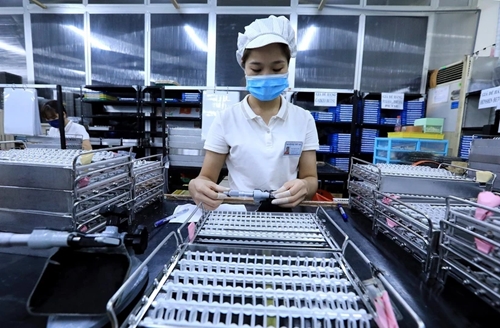According to the ministry’s Foreign Investment Agency, the total registered FDI capital in Vietnam this year to the end of July surpassed USD 18 billion, up 10.9% over the same period in 2023.
Notably, disbursed FDI capital reached more than USD 12.55 billion, up 8.4% over the same period last year. This is the highest volume of FDI capital disbursed in the January-July period in the last five years.
    |
 |
|
Lens production at a Japanese-invested firm in the Northern province of Hoa Binh |
Many international organizations projected that with this momentum, the volume of disbursed FDI capital in the coming time will continue to rise. An improved business environment and the implementation of major infrastructure projects can facilitate FDI attraction. Moreover, foreign investors are very interested in the semiconductor industry in Vietnam.
Minister Dung said that to further attract FDI in the coming time, the ministry will work to reduce difficulties for investors, especially those relating to institutions, laws, and administrative procedures.
Vietnam will focus on attracting large-scale, high-quality, high-tech FDI projects in the processing, manufacturing, electronics, and semiconductor industries.
Regarding the development of the semiconductor industry in Vietnam, Dung affirmed that the recent coordination between the National Innovation Center (NIC) and domestic and international partners to develop microchip design training programs is an important step to help Vietnam to gradually master semiconductor technologies.
According to the Dong Nai Industrial Zones Authority (DIZA), in the first seven months of this year, the province attracted more than USD 1 billion in FDI, 46% higher than its planned target.
Newly licensed FDI projects in the province during the period were mainly in the semiconductor manufacturing, electrical and electronic components, mechanical engineering, textiles, and prefabricated metal products.
None of the projects were in the list of industries with factors causing environmental pollution or labor-intensive industries. They all met criteria on advanced technology, said the DIZA.
Chairman of Binh Duong Provincial People’s Committee Vo Van Minh said that to attract high-quality FDI, Vietnam needs to offer more incentives to hi-tech projects, continue administrative reforms and improve infrastructure, especially those to link airports, seaports, and major provinces/cities with industrial centers.
In addition, energy infrastructure also requires investment and upgrade, especially the development of renewable energy projects that meet the requirements of high-tech projects, protect the environment, and minimize CO2 emissions, he said.
Source: VNA